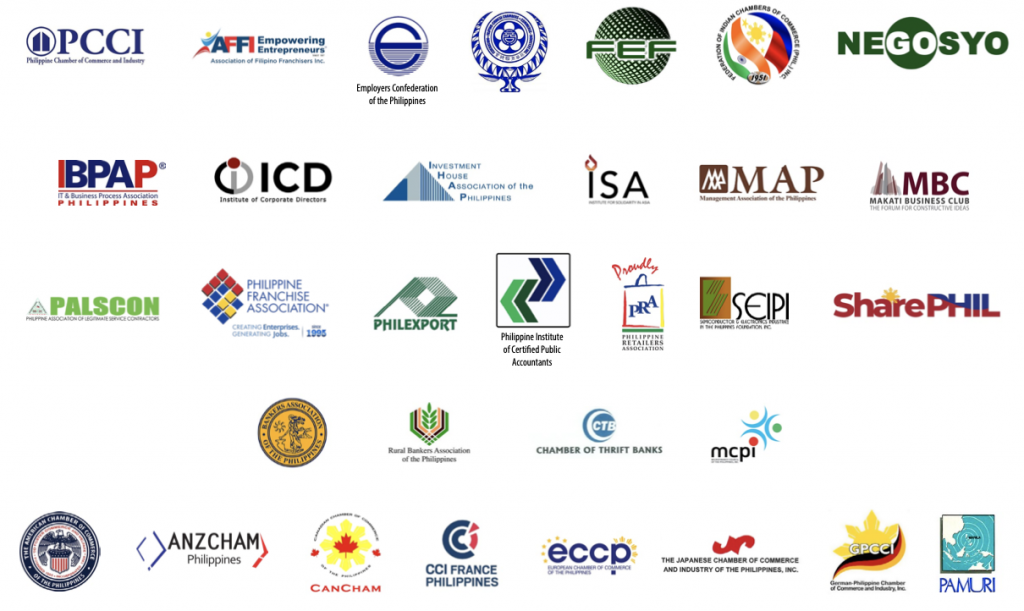The undersigned business organizations support the call of President Rodrigo Roa Duterte to call congress to a special session to pass a supplemental budget to respond to the COVID-19 pandemic and its economic effects.
We support the measures introduced by the government to reduce or slow the spread of COVID-19, including the intensified community quarantine for Metro Manila and other areas. However, the impact of the “lockdown” on millions of workers — both informal workers who are barred from making a living, and regular workers who may be laid off as companies respond to falling or disappearing sales — is literally a matter of life and death for them and their families. A health issue is now also a hunger issue and may trigger violence and longer term social tensions.
To mitigate the suffering of Filipinos and reduce damage to the society and economy, we urge Congress, in coordination with the Administration, to commit to a more forceful action on the fiscal front.
The Bangko Sentral ng Pilipinas has taken decisive steps to help address the impact of the crisis including the second consecutive bigger rate cut yesterday and the relaxation of certain regulatory measures to encourage more lending by banks. The onus is now on the fiscal side.
Many companies are doing what they can to keep their employees paid despite their inability to work and drastic declines in sales. But they can only do so much compared with the millions who are vulnerable to the downturn.
We believe the government can and should adopt a fiscal stimulus program that will raise our deficit-to-GDP ratio to close to 5 percent, which is a usual red flag for credit watchers, though they will probably relax as an unprecedented number of countries buttress their economies.
Assuming GDP growth slows to 4.5 percent (GDP: 20.0 trillion), a 5 percent deficit will be P1 trillion. Subtract the programmed deficit of 3.6% (P720 billion), and there is room for a P281 billion fiscal stimulus program.
Assuming GDP growth slows to 3 percent (GDP: 19.7 trillion), a 5 percent deficit will be 987.5 billion. Subtract the programmed deficit of 3.6% (P711.3 billion), and there will be room for a P277 billion fiscal stimulus program.
The Department of Finance’s quick P27 billion package is a great start. The budgetary items there, as well as in proposals of Rep. Joey Salceda and others can and should be counted as part of a maximum fiscal response. We believe the response should include:
- Additional funds for CCT recipients, who are by definition the most financially vulnerable sector and will suffer greatly if/when they lose their livelihood during this time.
- Additional funds to support DOLE and other programs to support workers affected by quarantine, whether directly or through companies, including when companies have advanced this.
- Other measures to transfer funds or food to low-income families
- Additional funds for temporary hospitals and quarantine areas to ensure health system can cope with surge in patients
- Funds to support businesses — especially MSMEs — when COVID-19 is under control, with a focus on hiring
- Targeted subsidies to the health, tourism and transport industries as in Malaysia and Italy
- Increased public investment spending as in Germany
- Deferment of penalties related to interest payments
Funds may also be sourced from savings or mandated savings of government agencies — except DOH, LGUs and other frontliners in the current crisis — and government-owned and controlled corporations (GOCCs) to support all vulnerable sectors (informal worker, micro and small enterprises, etc.).
This massive stimulus will save lives and protect our society but will not trigger alarm bells in the credit rating and global investment community as the Philippine debt/GDP measure is only likely to rise from 41.5% to 44.2%. It was almost 70% about 15 years ago.
The Administration and the DOF have done a great job improving the country’s finances. Now is the most critical time to put it in service of the sovereign people.

Philippine Chamber of Commerce and Industry
Association of the Filipino Franchisers Inc.
Employers Confederation of the Philippines
Federation of Filipino Chinese Chamber of Commerce and Industry, Inc.
Foundation for Economic Freedom
Federation of Indian Chambers of Commerce (Phil.) Inc.
Philippine Center For Entrepreneurship / Go Negosyo
IT & Business Process Association of the Philippines (IBPAP)
Institute of Corporate Directors (ICD)
Investment House Association of the Philippines
Institute for Solidarity in Asia
Management Association of the Philippines
Makati Business Club
Philippine Association of Local Service Contractors, Inc.
Philippine Franchise Association
PHILEXPORT
Philippine Institute of Certified Public Accountants
Philippine Retail Association
Semiconductor and Electronics Industries in the Philippines, Inc. (SEIPI)
Shareholders’ Association of the Philippines (SharePHIL)
Bankers Association of the Philippines
Rural Bankers Association of the Philippines
Chamber of Thrift Banks
Microfinance Council of the Philippines
American Chamber of Commerce of the Philippines
Australian-New Zealand Chamber of Commerce Philippines (ANZCHAM)
The Canadian Chamber of Commerce of the Philippines
French Chamber of Commerce and Industry in the Philippines
European Chamber of Commerce of the Philippines
Japanese Chamber of Commerce and Industry of the Philippines
German-Philippine Chamber of Commerce and Industry, Inc. (GPCCI / AHK Philippinen)
Philippine Association of Multinational Companies Regional Headquarters, Incorporated (PAMURI)
